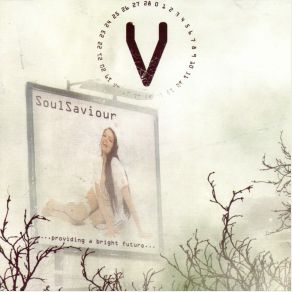SoulSaviour
Download links and information about SoulSaviour by V: 28. This album was released in 2006 and it belongs to Rock, Metal genres. It contains 9 tracks with total duration of 40:20 minutes.

|
|
|---|---|
| Artist: | V: 28 |
| Release date: | 2006 |
| Genre: | Rock, Metal |
| Tracks: | 9 |
| Duration: | 40:20 |
| Buy it NOW at: | |
| Buy on iTunes $8.91 | |
Tracks
[Edit]| No. | Title | Length |
|---|---|---|
| 1. | The Brightest Light | 1:28 |
| 2. | Unleash The Energy | 3:16 |
| 3. | A Prophecy Written In Uranium | 5:21 |
| 4. | Infected By Life | 3:20 |
| 5. | The Purifying Flames | 6:47 |
| 6. | Solid Structure Unknown | 5:02 |
| 7. | As The Sky Opens | 5:17 |
| 8. | DeConstructor | 3:54 |
| 9. | Dead Men's Choir | 5:55 |
Details
[Edit]The second part of a promised three-album trilogy, V:28's Soulsaviour (subtitled "Providing a Bright Future") presents an almost scientific study into how to compose a progressively industrialized, post-black metal album. That is: fuse black metal's nihilistic rawness with industrial music's conversely regimented assault (A) to serve as foundation and overall link connecting numerous styles, including jagged, thrash-based riffing (B), frequent downshifts into slower doom territory (C), and even forays into ambient sound designs (D). Under these policies, most of the album's tracks are quite easily described thus: "The Brightest Light" (D), "A Prophecy Written in Uranium" (A & B), "Dead Men's Choir" (C & D), "Unleash the Energy," "The Purifying Flames," and "Solid Structure Unknown" (A, C, & D). And if that seems like an overly clinical or downright lazy way to go about analyzing Soulsaviour's contents (ok, so it is!), then it's only because V:28 seems to employ a similarly analytical and contrived set of methods in composing them. In fact, lone diversions from the blueprint — and extremely subtle ones at that — are limited to a couple of techno beat-inflected tracks ("Infected by Life" and "As the Sky Opens"), and the highly effective cold-voiced recitations applied to the nicely dread-inducing "deConstructor." Take the latter offerings into account and get past the album's oft-predictable and repetitive formulations (no help from the mostly impenetrable lyrics foreseeing all manner of hellfire and damnation), and one might find it possible to ignore that insidious and disturbing sense of contrivance mentioned earlier. But the fact remains that, barring some incredible innovation waiting to be revealed by the final leg of this three-album trilogy, V:28 aren't breaking any new ground.